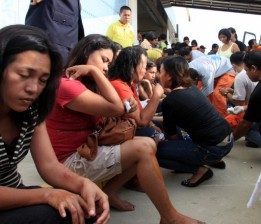Rise in poverty due to calamities—DSWD

Residents receive medical treatment for injuries after shoppers rushed outside a shopping mall when a 5.7 magnitude earthquake hit Surigao City, Surigao del Norte province, on March 16, 2012. The Department of Social Welfare and Development on Monday, May 7, 2012, blamed the earthquake and typhoon in the Visayas and Mindanas as behnd the increase in the number of people who rated themselves poor AFP PHOTO/Roel Catoto
Recent natural calamities in the Visayas and Mindanao could be behind the increase in the number of people who view themselves as poor, the Department of Social Welfare and Development (DSWD) said Monday.
In a statement, the DSWD said that Tropical Storm “Sendong,” which caused massive flooding when it hit the country in December, and the 6.9-magnitude earthquake that struck off Dumaguete in February, affected thousands of families that lost their homes and loved ones in the twin calamities.
A recent Social Weather Stations survey showed that 11.1 million Filipino households considered themselves poor in March, up from the 9.1 million households that felt the same way in December.
The survey also showed that self-rated poverty in Mindanao was at 72 percent in March, up from 38 percent in December. In the Visayas, self-rated poverty rose from 52 percent to 61 percent.
The DSWD said that households affected by the earthquake and typhoon in the Visayas and Mindanao were still reeling from the impact of these events. “While government interventions kept pouring in, it will take time before the affected families can settle and lead normal lives,” the DSWD added.
Article continues after this advertisementThe DSWD, the statement said, was working double time to help the earthquake and typhoon victims by providing them with core shelter units and livelihood assistance. It added that the rise in the number of households that considered themselves poor would be a chance for the department to serve more marginalized households with its social protection programs.
Article continues after this advertisementIt said that for this year, some three million families would benefit from the government’s conditional cash transfer program, a slight increase from the current 2.9 million beneficiaries.
Under the program, indigent families could receive up to P1,400 monthly cash assistance in exchange for sending their children to school and ensuring that pregnant women received regular medical checkups.
The DSWD said that families that had graduated from the cash program would be provided with livelihood opportunities through microenterprise management, capital assistance and guaranteed employment.